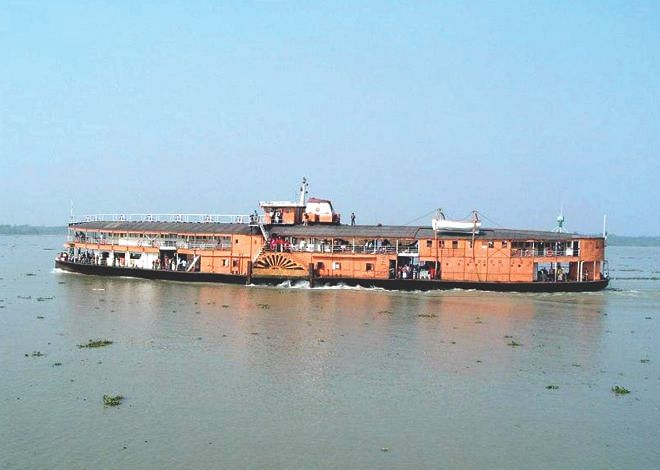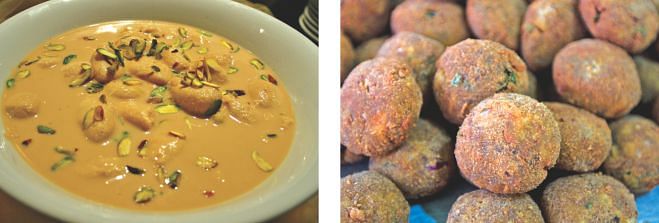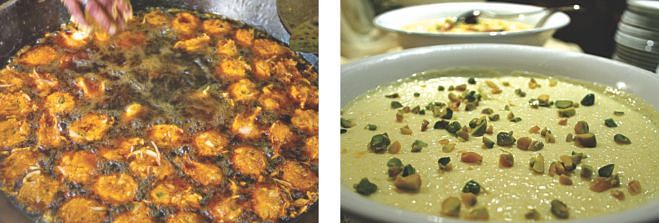Savouring country delicacies
Savouring country delicacies
Iftar in a different setting

Nowadays, when one looks at the front pages of the national dailies or at the electronic media, one can hardly be unaware of the frenzied customers and not feel the pulse of the denizens at the shopping arcades. Makeshift stalls and restaurants are selling the mouth watering iftar items ranging from jilapi, halim, doi-bara and many more. Ramadan is on.
But I wonder why there are no pictures of how Ramadan is observed in villages!
My memory takes me back to my early visits to Sujabad, my ancestral home in Barisal, in our younger days and how we observed Ramadan.
After a night-long journey, the big steamer 'Kiwi' finally docked at the shores of Barisal at dawn. From there, we boarded a boat for the final leg of the journey. The boat was clean, bright and spacious enough to be comfortable even for our large group.
As the boat started off towards Sujabad, we all rushed to the prow to breathe in the fresh breeze from the river.
The trip was a long-awaited one for the entire family. We had planned to spend some days of Ramadan with our grandparents. And our eager grandparents could scarcely wait for our huge 'troop' of cousins, nieces and nephews to arrive.

The sighting of the moon was always a special event. We made fun wagers on who would spot it first. That night we would gather in the attic to catch a glimpse of the elusive silver crescent. As someone sighted it, we all scrambled towards that end to get a closer look of the 'thin strand'--the new moon. The chanting of Azaan from the mosque heralded the start of Ramadan. The firecrackers went off next, probably some miles away. In the villages this was another simple way to spread the word!
The mehedi (henna) leaves had already been crushed and prepared into a fine paste. Then would begin the mad rush to have the most 'artistic' aunt paint floral designs on our palms with the vermilion mehedi. While some got busy preparing dinner for the guests (with the greatest dexterity so as not to smudge the fresh mehendi..!), others left for the family mosque for prayers.

At night, we huddled around the fire in the centre of the courtyard, as the tantalising aroma of kebabs and a long session of songs from bygone days, put us in the mood for a hearty dinner. The food ranged from paturi (prawns wrapped and baked in banana leaves), fried fish, to khichuri, plain rice and thick lentils, fresh vegetables, salads, pickles and dessert. Grandparents being grandparents, they insisted we at least taste every single dish.
Soon after, we would settle in for the night. Dinner would be taken early, so by the time it was 3 o'clock in the morning we would all be up for another round of meal--sehri! Though it wasn't a pleasant experience to take meals at such early hours, there was the pleasure of being with your close ones and take vow to fast for the next day. Dessert would invariably be topped with a bowl full of thick creamy milk with molasses and banana.
By the next morning, all tiredness forgotten, we would wake up with full vigour from the magic of the riverside air. While the boys took to chess and carom, the girls would lend a hand to dadijan (grandma) in preparing meals for the evening.
It was always a festive event not for just one household but for the entire neighbourhood. The brides lent a hand with the grinding of rice and spices. Some would accompany the elders to the nearby pond where fishermen were busy catching the king prawns and the ruhi fish. As the day light faded away, it would be time for a hearty iftar.
In the family room, a big dastarkhan (linen) with neat embroidery was laid out on the floor. Glasses were filled with fresh lime juice, tokma, doi er sherbet or tender coconut water. This was followed by dates, piaju, muri, chhola, alu puri, dal puri and, last but not the least, the puffed rice balls with molasses; the moa--and a variety of pitha (cake) with date palm juice and thick milk. According to elders, flattened rice-- chira and curd were what cooled the system after a long day of fasting.
Besides the rich array of delicacies, what moved me most was the way neighbours would join in, stop by for a chat, arrange for iftar together, and simply enjoy each other's company. Elders would complain about the price of foodstuff, boys about who caught the largest fish; and young girls--well there was no end to the chatter! It was not simply a quick iftar and rush off to watch TV; it was a time for bonding after a long day.
As we boarded our ship for the return trip, the happy visions of my family remained with me. Many years on, many miles away, I still hold dear those experiences. And for those of us who have enjoyed similar times, we know it's a time that will be cherished forever.